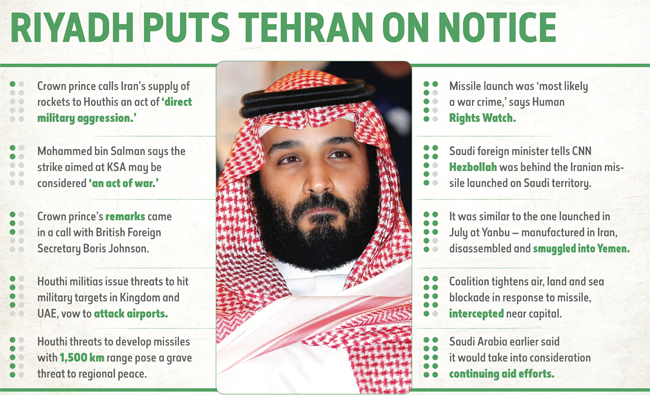JEDDAH: The US accused Iran on Tuesday of breaking international law by supplying ballistic missiles fired at Saudi Arabia, and said the US would “not turn a blind eye to these serious violations.”
“By providing these types of weapons to the Houthi militias in Yemen, Iran’s Revolutionary Guard Corps is violating two UN resolutions simultaneously,” said Nikki Haley, the US ambassador to the UN.
“We encourage the UN and international partners to take the necessary action to hold the Iranian regime accountable.”
Iran supplied missiles fired at Makkah in July, and most recently at Riyadh last Saturday. Both were launched from Yemen. The Houthis boasted on Tuesday that they had ballistic missiles with a range of 1,500km and threatened to attack more cities in Saudi Arabia and the UAE.
Col. Aziz Rashed, an army spokesman with a Houthi-allied unit, warned travelers to stay away from Saudi and UAE airports. “All airports, ports, border crossings and areas of any importance to Saudi Arabia and the UAE will be a direct target of our weapons,” a Houthi spokesman told reporters in Sanaa, according to The Associated Press.
Haley has accused Iran in the past of illegal arms deals and military support in Yemen, Lebanon and Syria, and has repeatedly called on the UN Security Council to take a tougher stance.
Under the UN Security Council resolution that enshrines the 2015 Iran nuclear deal, Tehran is prohibited from supplying, selling or transferring weapons outside the country unless approved in advance by the Security Council.
A separate UN resolution on Yemen bans the supply of weapons to militia chief Abdul Malik Al-Houthi, two Houthi commanders, Yemen’s former President Ali Abdullah Saleh, his son, and “those acting on their behalf or at their direction.”
Washington’s options now are to ask the Security Council’s 15-member Yemen sanctions committee to blacklist individuals or groups, or to seek a new Security Council resolution to impose sanctions on Iran. The latter is likely to be vetoed by Russia, according to a Reuters report.
In a phone conversation on Monday night, Saudi Crown Prince Mohammed bin Salman told British Foreign Secretary Boris Johnson that the involvement of the Iranian regime in supplying Houthi militias with missiles “is considered a direct military aggression by the Iranian regime and may be considered an act of war against the Kingdom.”
Johnson condemned the missile launch against Riyadh last Saturday and the deliberate targeting of civilians, and said Britain stood with Saudi Arabia in confronting security threats.
The missile launch was “most likely a war crime,” Human Rights Watch said on Tuesday, and was carried out by the Lebanese militant group Hezbollah, Saudi Foreign Minister Adel Al-Jubeir said. “It was an Iranian missile launched by Hezbollah from territory occupied by the Houthis in Yemen,” Al-Jubeir said in an interview with CNN on Monday.
In the US, Pentagon spokesman Marine Maj. Adrian Rankine-Galloway said Saudi Arabia had exposed Iran’s “malign role in Yemen” and its provision of dangerous missile systems to Houthi militants. “We continue to maintain strong defense ties with the Kingdom of Saudi Arabia and work together on common security priorities to include combat operations against violent extremist organizations, and neutralizing Iran’s destabilizing influence in the Middle East region,” he said.
In Riyadh, Canadian Ambassador Dennis Horak condemned the missile attack on the city. “This attack constitutes a serious escalation in the conflict and poses a growing risk to regional stability and security,” he said in a written statement to Arab News.
“The intentional targeting of civilians cannot be tolerated and Canada calls on the Houthi rebels and their supporters to refrain from such indiscriminate attacks against civilians in both Yemen and Saudi Arabia,” he said.
Oubai Shahbandar, a Syrian-American analyst and fellow at the New America Foundation’s International Security Program, said: “It is clear that the leadership in Tehran is shipping more advanced missiles to Houthi militias with the specific aim of targeting major Saudi cities, such as Riyadh.
“Iran is already banned from proliferating advanced missiles to regional terrorist organizations like Lebanese Hezbollah, but they continue to move these deadly weapon systems which are ultimately used as a terror weapon to target civilians. The Houthi militias are copying Hezbollah’s playbook. The only real solution is to neutralize the problem at its source — the missile shipping and manufacturing centers in Iran.”
Iran’s supreme leader Ayatollah Khamenei and Revolutionary Guards Quds Force commander Qasem Soleimani “care little about UN Security Council Resolutions where they can count on the Russian veto,” Shahbandar said.
“The only language they truly understand is that of power and deterrence. They must be made to believe that they have crossed a red line and that any further strategic missile strikes will be met with a crippling response.”
US ‘will not turn blind eye’ as Iran supplies missiles
US ‘will not turn blind eye’ as Iran supplies missiles











